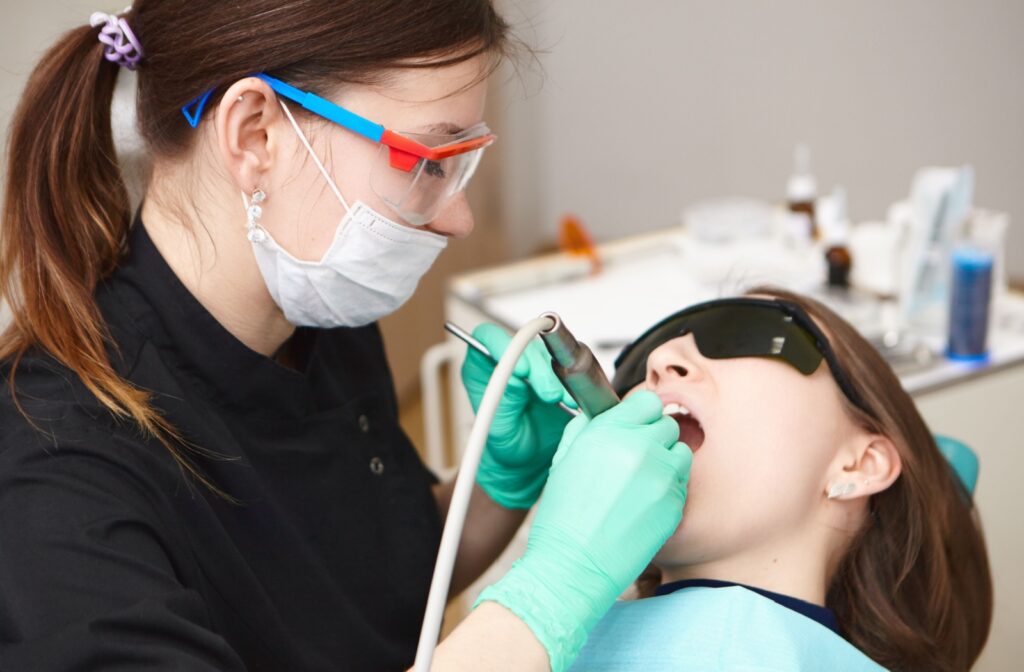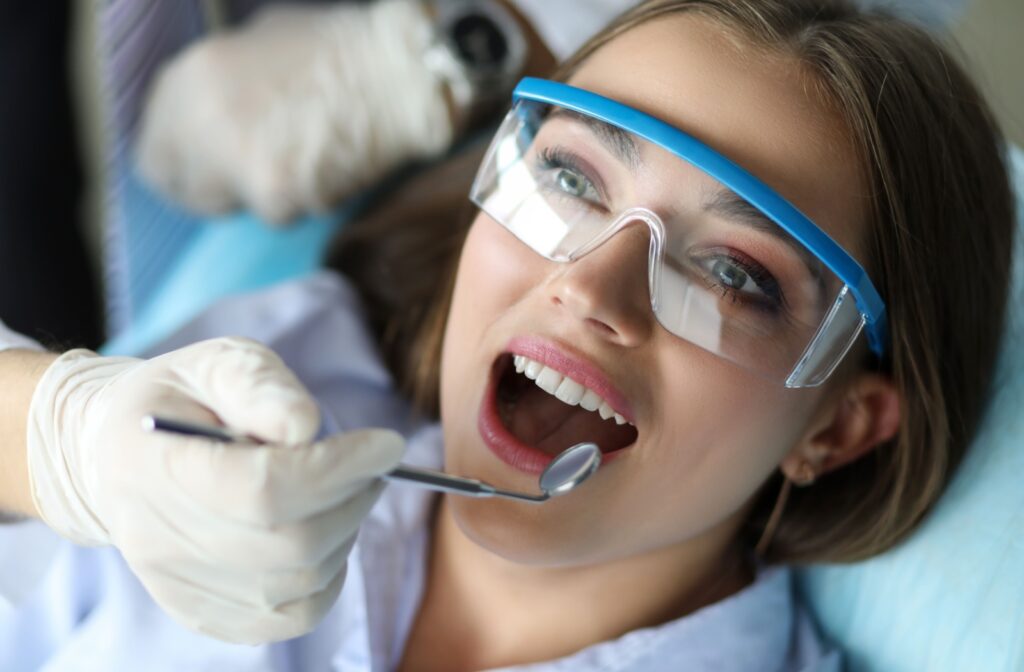Maintaining good oral health takes more than brushing and flossing at home. A typical hygiene appointment includes a few key steps: a clinical exam, scaling, root planing if needed, polishing, and fluoride treatment. These appointments are designed to prevent dental problems, support early detection, and help you maintain a healthy smile over time.
Many people think of this visit as just a cleaning, but it’s actually a comprehensive check-in on your overall oral health. Your dental team uses this time to monitor changes, offer personalized advice, and provide care that supports your health between appointments.
What to Know Before Your Appointment
Knowing what to expect can help your visit go smoothly and help your dental team have all the information they need to support your care.
Before your appointment:
- Bring a list of any medications you’re currently taking.
- Let your dental team know about recent health changes or diagnoses.
- Tell them if you’ve experienced sensitivity, discomfort, or bleeding gums.
- Don’t avoid brushing or flossing.
- Write down any questions you’d like to ask about your home care routine.
What Happens During a Dental Cleaning?
A visit is much more than a “cleaning,” it involves more than just polishing your teeth. This appointment is designed to prevent disease, remove harmful buildup, and support long-term oral health.
Medical and Dental History Review
Every visit begins with a review of your current medications, medical history, and recent health updates. This helps your dental team tailor care to your needs and identify any health conditions that may affect your oral health.
Oral Assessment
Your hygienist will perform a full oral assessment to examine the condition of your teeth, gums, jaw, and soft tissues. This includes:
- Checking for gum inflammation or signs of gum disease
- Inspecting the tongue, cheeks, and other soft tissues
- Measuring gum pocket depths
- Identifying areas of plaque or tartar buildup
- Reviewing bite alignment and jaw function
X-rays may also be taken to help detect decay, bone loss, or other issues.
Scaling and Root Planing
Scaling involves removing hardened plaque (calculus) from the surfaces of your teeth, especially around and below the gumline. Root planing smooths the root surfaces of the teeth, helping to reduce inflammation and discourage future buildup.
These procedures are important because plaque that hardens into tartar can irritate the gums and lead to gingivitis or periodontitis (gum disease). If left untreated, gum disease can cause gum recession, tooth mobility, and eventual tooth loss.

Polishing
Once your teeth have been thoroughly cleaned, your hygienist will polish them using a rotating handpiece and a slightly abrasive paste. This helps remove soft plaque, surface stains from things like coffee or tobacco, and any residual biofilm that wasn’t removed during scaling.
Polishing isn’t just cosmetic; it creates a smooth surface that makes it harder for new plaque to accumulate. This step helps maintain a clean mouth between visits and supports your daily brushing and flossing habits.
Fluoride Treatment
If recommended, a fluoride gel or varnish may be applied to your teeth as part of your hygiene visit. Fluoride strengthens the outer layer of your teeth (enamel), making it more resistant to acid attacks from bacteria and food.
- Remineralize areas of early enamel erosion
- Reduce the risk of tooth decay
- Lessen tooth sensitivity
- Protect teeth for both children and adults at higher risk of cavities
This treatment is quick, painless, and can provide long-term protection between hygiene visits.
Oral Assessments Support Early Detection and Prevention
Oral assessments are a key part of preventive care. They allow your dental team to spot small issues before they turn into bigger problems. Conditions like tooth decay, gum disease, and even oral cancers can often be detected early during routine hygiene visits.
Oral health is also connected to other health concerns, including:
- Diabetes
- Heart disease
- Respiratory infections
- Pregnancy complications
By staying on top of regular assessments, you’re not just protecting your smile, you’re supporting your overall health.
Personalized Dental Hygiene Recommendations
After your oral assessment and cleaning, your hygienist will share customized recommendations based on your needs, lifestyle, and risk factors.
This might include:
- How often to return for hygiene visits (every 3, 4, or 6 months)
- Which dental products may help your condition or concerns
- Tips for improving brushing or flossing technique
- Nutritional advice to support healthier teeth and gums
If your dentist identifies a concern, such as a cavity, gum recession, or a concern with your bite, they may suggest additional diagnostics or treatment planning.
Book Your Next Oral Assessment
These assessments are more than just a cleaning; they’re a foundational part of keeping your mouth and body healthy. At Hometown Dental, the goal is to provide educational, thorough care that helps you feel confident and supported. Whether you’re returning for routine maintenance or scheduling your first visit in years, book your oral assessment with our team, we’re here to support you with friendly, judgment-free care.





